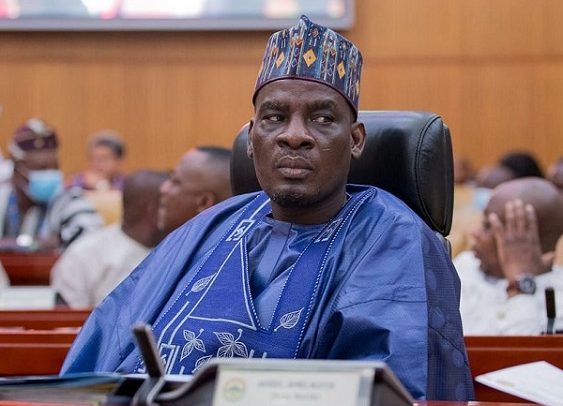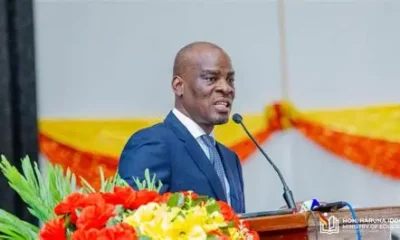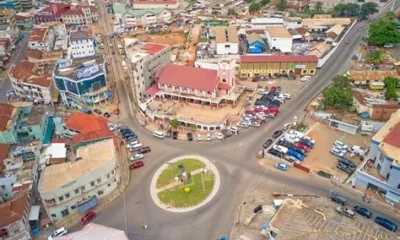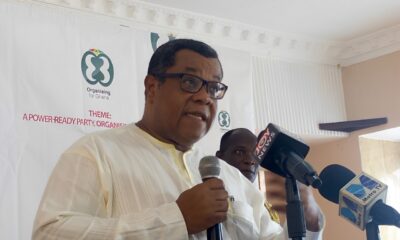Published
7 months agoon
By
Adubianews
The Ghanaian government is moving to amend the Ghana Investment Promotion Centre (GIPC) Act as part of its bold strategy to operationalise the country’s 24-hour economy, a flagship policy of President John Dramani Mahama.
This announcement came from Education Minister Haruna Iddrisu, who appeared on JoyNews PM Express on Wednesday, July 2. He stated that the revised law would embed business incentives as a central part of the policy’s execution, enabling industries to operate seamlessly across three shifts.
According to the Minister, this legislative overhaul is designed to attract both local and international investors to sectors like textiles, manufacturing, logistics, and technology, with a clear focus on 24/7 productivity. He suggested that state-owned firms such as Juapong Textiles and Akosombo Textiles could be revitalized under this framework, allowing round-the-clock production through private investment.
“President John Dramani Mahama and the NDC government will give you the needed incentives to do that,” he assured, emphasizing the creation of an enabling environment with reliable access to utilities like electricity and water.
Beyond boosting industrial activity, Iddrisu stressed that the 24-hour economy is a long-term strategy to reduce Ghana’s dependence on imports and increase employment.
“No country can develop relying on imports,” he said. Echoing Mahama’s sentiments, he challenged Ghana’s continued export of raw materials while importing costly finished products. “Why are we only experts in producing and exporting raw materials, and we are the same people who now import it costly and pay for it?” he asked.
The government is also planning to institutionalise the policy by establishing a statutory body to oversee it, with funding potentially drawn from the Ghana Infrastructure Fund and a proposed 2.5% import levy aimed at discouraging excessive importation.
Launched officially on July 1, the 24-hour economy is structured around eight transformative pillars: Grow 24, Make 24, Build 24, Show 24, Connect 24, Fund 24, Aspire 24, and Go 24, all geared towards expanding Ghana’s economic capacity.
The GIPC is already adapting to support this policy. Earlier this year, it realigned operations to facilitate 24-hour services and, in April, introduced a premium expedited investment registration service for companies wanting to operate within the new framework.
To make the policy attractive, a series of tax and regulatory incentives is being introduced. These include:
Import duty waivers on raw materials and industrial machinery
Corporate tax breaks for businesses running multiple shifts
Lower electricity tariffs for night operations
Iddrisu acknowledged the scale of transformation required but insisted that the time is ripe for Ghana to embrace a new economic model. “This is the time for the country to embrace it. It is years of thinking, years of reflections,” he said.
The revised GIPC Act is expected to simplify investor processes, digitise government services, and ensure strategic alignment between policy goals and industrial investment, laying the foundation for a productive, inclusive, and self-reliant Ghana.


Haruna Iddrisu Engages Google on Using AI to Transform Education in Ghana


Gov’t Not Responsible for Poor 2025 WASSCE Results – Education Minister


Education Minister Warns Headteachers Against Unapproved Fees


FUND24 Critically Flawed and Risky – Africa Policy Lens Warns


Fidelity Bank Backs Ghana’s 24-Hour Economy with Cross-Border Finance Solutions


Government to Establish Machinery Park in Kumasi Under Make24 Plan


Grow24 to Revolutionize Ghana’s Agriculture, Says Goosie Tanoh


Edem Agbana Endorses 24-Hour Economy as Transformative for Ghana


Haruna Iddrisu: Mahama’s 24-Hour Economy Is a Serious National Plan, Not a Slogan

























